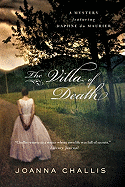National Book Awards: A Celebration of Communities
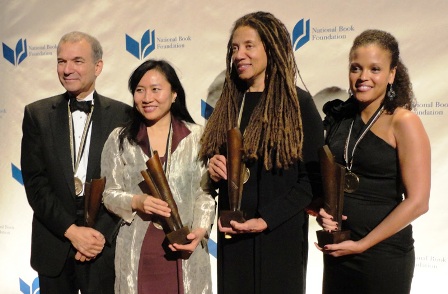 "The word national in the National Book Awards has been wonderfully represented tonight," said Nikky Finney, whose poetry collection Head Off & Split (TriQuarterley) was one of the winning titles at last night's ceremony, commenting on the diversity among this year's honorees and how they represented several of America's communities rather than just one. Receiving the award earlier in the evening, she gave an impassioned speech touching not just upon her mentors but on the turbulent history of African-American literacy, which moved master of ceremonies John Lithgow to declare, "That was the best acceptance speech for anything that I've ever heard in my life." As she accepted the fiction prize for her novel Salvage the Bones (Bloomsbury), Jesmyn Ward spoke about how she was inspired to write as a way to honor the life of a brother who died young, and how her ambitions have expanded to tell the stories of the South's poor, black, and rural disenfranchised. "This is a life's work," she said, "and I am only at the beginning."
"The word national in the National Book Awards has been wonderfully represented tonight," said Nikky Finney, whose poetry collection Head Off & Split (TriQuarterley) was one of the winning titles at last night's ceremony, commenting on the diversity among this year's honorees and how they represented several of America's communities rather than just one. Receiving the award earlier in the evening, she gave an impassioned speech touching not just upon her mentors but on the turbulent history of African-American literacy, which moved master of ceremonies John Lithgow to declare, "That was the best acceptance speech for anything that I've ever heard in my life." As she accepted the fiction prize for her novel Salvage the Bones (Bloomsbury), Jesmyn Ward spoke about how she was inspired to write as a way to honor the life of a brother who died young, and how her ambitions have expanded to tell the stories of the South's poor, black, and rural disenfranchised. "This is a life's work," she said, "and I am only at the beginning."
Just before the young people's literature award was presented to Thanhha Lai for Inside Out & Back Again (Harper), there was a muted reference to the controversy surrounding the shortlist, as the jury's chair, Marc Aronson, described 2011 as "a bad year for muffled phone calls with disastrous consequences." (He didn't mention Lauren Myracle or Shine by name, but drew an extended parallel to the St. Louis Cardinals and how, like them, "although we had our little detour, we ultimately had a triumph.") Lai was still dazed by her win at the ceremony's end, noting that it was far beyond the expectations she'd had for a story she originally started telling to share with her nieces and nephews.
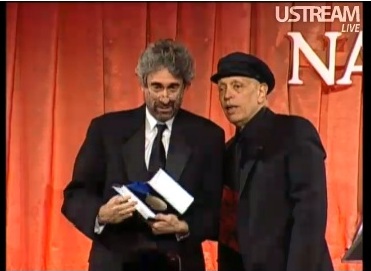 |
| At the ceremony last night, Mitchell Kaplan of Books & Books received the Literarian Award for Outstanding Service to the American Literary Community, for his work in founding the Miami Book Fair International, now in its 28th year. Walter Mosley presented the award. In his acceptance speech, Kaplan said, "I stand shoulder-to-shoulder with booksellers everywhere, who are doing the same work in their communities.... Writers are writing marvelous books. Readers want to read and find them.... We need to reassert the place of the bookseller.... Our challenge today is to figure out how to solve the complex distribution issues that have arisen in the world we live in." |
This year's nonfiction prize went to Stephen Greenblatt for The Swerve: How the World Became Modern (Norton). "Who ever thought that a book about a book nerd would win a National Book Award?" quipped National Book Foundation executive director Harold Augenbraum (who also pointed out that this was the second year in a row that women writers won in three of the four categories, and comprised 12 of this year's 20 nominees). Greenblatt thanked the poet Lucretius, whose On the Nature of Things was the book discovered after a millennium's absence by Poggio Bracciolini--that 15th-century "book nerd"--helping set the Renaissance in motion. Then, reflecting that "a poem is a text written by an individual, but a book is something that's collectively done," he went on to thank the traditional assortment of publishing colleagues and family members--as Lithgow joked, "That was a damn good acceptance speech, too!" --Ron Hogan










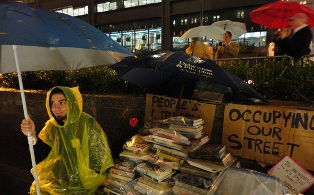 The National Book Awards were held at the Cipriani Ballroom at 55 Wall Street, just a few blocks away from Zuccotti Park, where the Occupy Wall Street movement was still recovering from a raid by New York City police in the early hours of Tuesday morning. Damage from that raid included the roughly 5,000-volume "People's Library," although contributors began bringing more books down to the park almost as soon as it re-opened. By late Wednesday afternoon, volunteer librarian Hristo was standing guard over a few hundred titles, stored in several jumbo-sized Ziploc bags to protect them from rain. Contrary to claims by city officials that the library had been preserved during the raid, he said that the majority of the books had been damaged when seized by authorities. (His description was
The National Book Awards were held at the Cipriani Ballroom at 55 Wall Street, just a few blocks away from Zuccotti Park, where the Occupy Wall Street movement was still recovering from a raid by New York City police in the early hours of Tuesday morning. Damage from that raid included the roughly 5,000-volume "People's Library," although contributors began bringing more books down to the park almost as soon as it re-opened. By late Wednesday afternoon, volunteer librarian Hristo was standing guard over a few hundred titles, stored in several jumbo-sized Ziploc bags to protect them from rain. Contrary to claims by city officials that the library had been preserved during the raid, he said that the majority of the books had been damaged when seized by authorities. (His description was 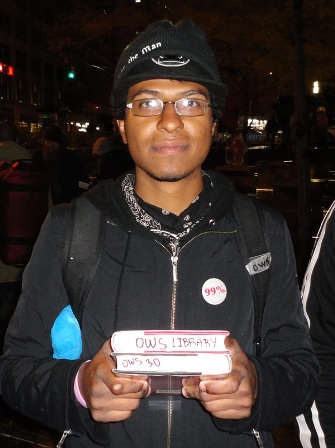 An hour later, as guests began arriving at Cipriani for the pre-awards NBA reception, the NYPD returned to the park, providing a solid line of security for a Brookfield sanitation crew as they tossed the entire contents of the restored library into a Dumpster. News of this second seizure spread rapidly as people with access to Twitter began telling others at Cipriani, and some attendees (including myself) encouraged others to take the books displayed on every table to re-restock the library after the ceremony was over. I took two YA nominees to a now near-deserted park, where another volunteer named Anthony vowed that the "People's Library" would rebuild again on Thursday, and we discussed an impromptu strategy: maybe this time, instead of stockpiling all the books in one place, every person taking part in the Occupation should carry a book or two, and people can ask each other what books they have, and if they can borrow them. The police can't seize books from citizens' hands, can they? --
An hour later, as guests began arriving at Cipriani for the pre-awards NBA reception, the NYPD returned to the park, providing a solid line of security for a Brookfield sanitation crew as they tossed the entire contents of the restored library into a Dumpster. News of this second seizure spread rapidly as people with access to Twitter began telling others at Cipriani, and some attendees (including myself) encouraged others to take the books displayed on every table to re-restock the library after the ceremony was over. I took two YA nominees to a now near-deserted park, where another volunteer named Anthony vowed that the "People's Library" would rebuild again on Thursday, and we discussed an impromptu strategy: maybe this time, instead of stockpiling all the books in one place, every person taking part in the Occupation should carry a book or two, and people can ask each other what books they have, and if they can borrow them. The police can't seize books from citizens' hands, can they? --
 In the wake of Amazon's Kindle Fire early release this week (
In the wake of Amazon's Kindle Fire early release this week ( Tablets may be dominating headlines recently, but a report this week from
Tablets may be dominating headlines recently, but a report this week from  Tattered Cover Book Store
Tattered Cover Book Store Renée Reiner and Michael DeSanto, co-owners of
Renée Reiner and Michael DeSanto, co-owners of  Restructuring at Houghton Mifflin Harcourt will result in the closure of the publisher's
Restructuring at Houghton Mifflin Harcourt will result in the closure of the publisher's 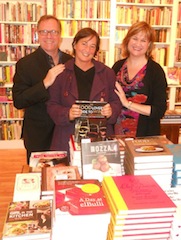

 Fox released images and an official synopsis for this week's episode of The Simpsons, on which special guest Neil Gaiman joins Homer's book-writing team.
Fox released images and an official synopsis for this week's episode of The Simpsons, on which special guest Neil Gaiman joins Homer's book-writing team. 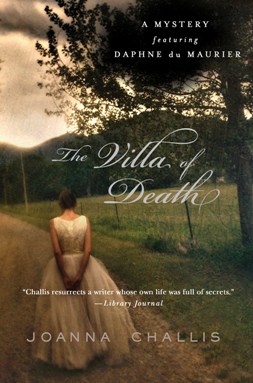 Third in Challis's series of Daphne Du Maurier Mysteries (Murder on the Cliffs and Peril at Somner House), this is another concoction of nostalgia. The story combines elements of Du Maurier's writing, a dollop of Agatha Christie and a smidgen of the Austens. It all adds up to somewhat less than the sum of those parts. At one point, Daphne says, "If anything happened to him, I didn't know what I'd do. I couldn't live without him." However, despite knowing that neither Christie, Du Maurier nor Austen(s) would have written those words, there is some redemption herein.
Third in Challis's series of Daphne Du Maurier Mysteries (Murder on the Cliffs and Peril at Somner House), this is another concoction of nostalgia. The story combines elements of Du Maurier's writing, a dollop of Agatha Christie and a smidgen of the Austens. It all adds up to somewhat less than the sum of those parts. At one point, Daphne says, "If anything happened to him, I didn't know what I'd do. I couldn't live without him." However, despite knowing that neither Christie, Du Maurier nor Austen(s) would have written those words, there is some redemption herein.